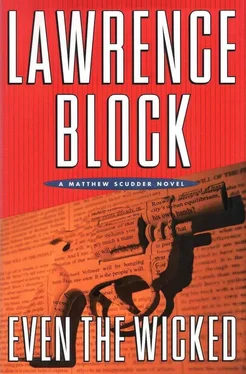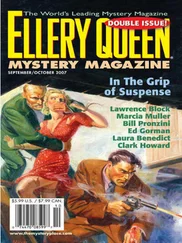“Unfortunately,” she said, “not everybody has a car.”
“Sad but true,” said Elaine, talking back to the television set. “Fortunately, however, just about everybody has a plastic bag. ‘Dad, can I borrow the car tonight? No? Well, can I borrow the plastic bag?”
The real victim, someone else maintained, was Kevin Dahlgren, who’d been subjected to no end of stress by virtue of the fact that Whitfield had been inconsiderate enough to drop dead in front of him. At least one talk show included a psychologist and a trauma expert talking about the possible short- and long-term impact of the incident upon Dahlgren.
Dahlgren ducked most interviews, and acquitted himself creditably when he was cornered. He had, he said, no opinion as to whether he’d witnessed an act of suicide or murder. His only regret was that there’d been nothing he could do to save the man’s life.
If Dahlgren didn’t want the victim role, a man named Irwin Atkins was eager to snatch it up for himself. Atkins was Adrian Whitfield’s final client, the brawler who’d decided to plead guilty to a misdemeanor assault charge just hours before Adrian Whitfield went off to argue his own case before a higher court. Building on the speculation that Whitfield had felt free to end his life once the case had been disposed of, Atkins served notice of his intention to file an appeal on the grounds that he’d been improperly served by counsel.
“He’s got two arguments,” Ray Gruliow told me. “One, Whitfield deliberately talked him into pleading because he was in a rush to go home and drink rat poison, or whatever the hell it was. Two, Whitfield’s suicidal state of mind impaired his judgment and rendered him incapable of furnishing sound legal advice. He could buttress his second argument by pointing out that Whitfield was sufficiently unbalanced as to take on a mutt like him for a client.”
“You think it’ll work?”
“I think they’ll let him withdraw the plea,” he said, “and I think he’ll regret it, the silly son of a bitch, when his retrial ends in a conviction.”
“And will it?”
“Oh, I’d say so. You pull something like that, withdraw an eleventh-hour plea, and you invite the widespread perception that you’re a pain in the ass. I think it’s all a load of crap anyway. Adrian didn’t kill himself.”
“No?”
“I’d never argue it’d be a bad choice, or that it wasn’t his choice to make. And I think he might have done it sooner or later. He could very well have been contemplating the act, might even have had it on his mind while he poured himself that drink. But I don’t believe he had the faintest idea there was anything in that bottle but good scotch whiskey.”
“Why?”
“Because what in the hell is the point? If Adrian was going to kill himself he’d damn well leave a note, and I wouldn’t have put it past him to get the document notarized. Anything else would have been inconsistent with the man.”
I’d thought as much myself.
“I’m not saying he lacked a sense of the dramatic. He was a trial lawyer, after all. If we didn’t like to be in the spotlight we’d spend our lives writing briefs in back rooms. I can imagine Adrian killing himself, and I can even see him doing it in front of witnesses. Remember Harmon Ruttenstein?”
“Vividly.”
“Invited some friends over, sat them down, gave them drinks, and told them he wanted them around so there wouldn’t be any horseshit about what happened. And then he took a header out the window. I’m committing suicide, he was saying, and I want you fellows here to attest to it. That’s completely different from what they say Adrian did.”
“He made it look like murder.”
“Exactly, and why? That’s the question nobody bothers to ask, maybe because nobody can answer it. Because there’s a stigma attached to it? Adrian wasn’t raised Catholic, and as far as I know the only thing he believed in absolutely was collecting fees in advance in criminal cases. Because he didn’t want to invalidate his insurance policies? They keep floating that in the press and on television, as if suicide automatically had that effect.”
“I was talking about that the other day,” I said. “It’s a pretty common misconception.”
“And of course it doesn’t apply, because Adrian’s coverage consisted entirely of policies which had been in force for years. He hadn’t applied for additional coverage since the doctor gave him the bad news. This all came out yesterday, but they’re still prattling about insurance. I just heard a new wrinkle. Double indemnity.”
“For accidental death?”
“Right. As far as the insurance companies are concerned, murder is an accident. It qualifies in that respect if the policy contains a clause specifying a two-hundred-percent payout for accidental death. Stupid clause, incidentally. You’re buying financial protection, what the hell’s the difference if you fall out of the hay loft or flake away with terminal psoriasis? If anything, you’d think it should be the other way around. It’s slow natural deaths that run up the costs for the family, so that’s when they’d need extra protection.”
“I gather suicide’s not considered accidental.”
“Well, you can’t argue it’s natural death, either, but it’s excluded from double-indemnity coverage in every policy I ever heard of. So it’s within the realm of possibility that a man would be sufficiently moved by consideration of his family’s financial well-being to commit suicide in such a manner as to resemble accidental death.” He took a breath. “Whew. Did you hear that? I sounded like a goddam lawyer.”
“You did at that.”
“But,” he went on, “there’s an easy way to do that, and it’s done all the time, and not necessarily to defraud an insurance company. All you have to do is get in your car and drive into a bridge abutment. I don’t know what the best guesses are as to percentages, but the conventional wisdom holds that a whole lot of unwitnessed single-car accidents are nothing but suicide, whether preplanned or spontaneous. It’s a foolproof method for killing yourself and being buried with the full rites of the Catholic church, and it would be just as effective in getting double payment from John Hancock and his friends.”
I thought of the earnest lady from the Hemlock Society. “And for city dwellers who don’t have cars—”
“There’s always the subway. You lose your balance and fall in front of it. Here’s the kicker, though. Say you’re determined to make it look like murder. Unless your name is Ed Hoch or John Dickson Carr, you’re not going to turn it into a fucking locked room murder, are you? Because that’s what this is. The security’s so tight, between the bodyguards and the burglar alarm, nobody can figure out how the hell Will got in there to drop the poison in. It’s so obviously impossible that half the city’s convinced Adrian must have done it himself, which is just what he’s supposed to have attempted to conceal. Does that make any sense to you?”
“Wherever Adrian is now,” I said, “if he needs an attorney, I think he ought to pick a guy named Gruliow.”
“I’m right, though, wouldn’t you say? Makes no sense.”
“I agree.”
“Well, let me frost the cupcake for you. All his coverage was term insurance, and there wasn’t a single policy with a double-indemnity clause. Case closed.”
He was convincing, but I wasn’t entirely convinced. I’d seen too many people do too many illogical things to rule out any act by a human being on the grounds that it didn’t make sense.
Meanwhile, there was still Will to be considered. Even if Adrian Whitfield had died by his own hand, you had to give Will an assist at the very least. One columnist argued, perhaps facetiously, that the anonymous killer was getting more powerful every time. He’d had to get out there and kill his first three victims all by himself, but all he’d had to do was point a finger at numbers four and five. Once targeted by Will, they were struck down with no effort on his part, Rashid by an enemy within his gates, Whitfield by an even more intimate enemy, the one who lived within his own skin.
Читать дальше












